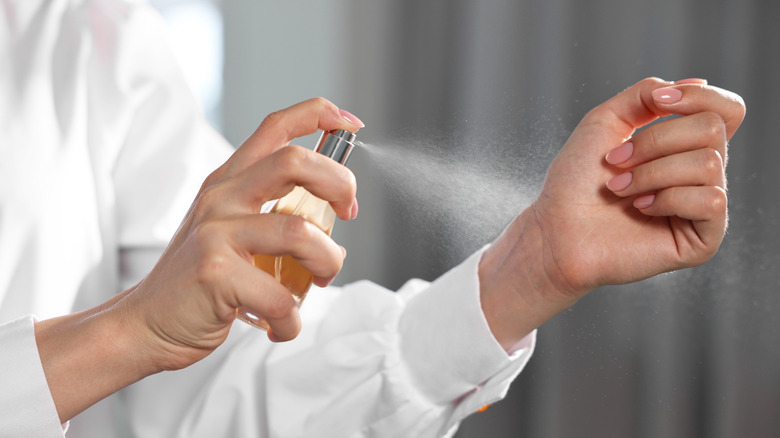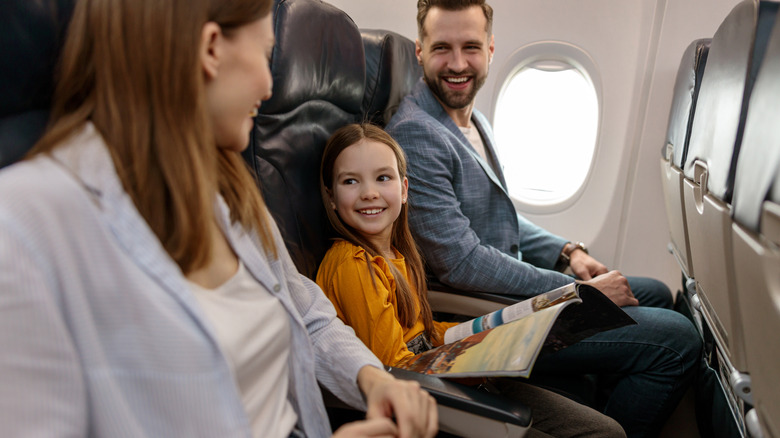The Dangerous Reason You Shouldn't Spray Perfume On An Airplane
When you're traveling by airplane, enjoying a few luxuries can help, like bringing a comfy blanket or some yummy snacks. (Here's why you should put sunscreen on before flying on an airplane.) Basically, any small comforts or strategies to ease anxiety while flying. But resist the temptation to slather or spray yourself with fragranced items. The aromas you love could spell discomfort — or even danger — for your fellow passengers.
Let's face it: You may have reserved around 17 to 18 inches of seat space, but the cabin airspace is communal property. As soon as the door closes, all the smells in a plane commingle. And while you may love your favorite vanilla musk perfume or cinnamon apple hand moisturizer, the folks around you might not find it so appealing.
Adeodata Czink, a professional in the field of social manners, bluntly explained the problem with treating an airplane like it was your house or car and going hog-wild with fragrances. Said Czink in a Seattle Times article, "It bothers the people seated around you, and they can't leave the plane."
How your perfume can be dangerous to your co-passengers
Czink's use of the word "bothers" may be somewhat of an understatement in certain cases. For some people, scents can create health problems. Just how bad can you inadvertently make someone else feel while you're both traveling to a shared destination? It depends on whether or not the person bothered by your fragrance has a sensitivity (akin to an intolerance) versus an allergy.
A fragrance sensitivity typically leads to less intense (but annoying and unpleasant) side effects like a stuffy nose or mild headache. (There are several reasons certain smells give you headaches, by the way, including underlying medical conditions.) Meanwhile, a clinical fragrance allergy causes different reactions. When you're allergic to a substance (like a fragrance), your whole system goes into protective mode. Hence, allergies have the capacity to trigger life-threatening responses, like anaphylaxis.
According to a 2019 study in Air Quality, Atmosphere and Health, 34.7% of individuals in the United States claim to be sensitive to fragrances. Their self-reported side effects ranged from migraines and sneezing to serious respiratory issues; a full 9.5% of those with sensitivities called their symptoms "disabling."
Becoming a fragrance-free flyer
Fortunately, not everyone with an allergy to fragrances exhibits a reaction requiring emergency attention. But since you can't tell if the people around you are going to be inconvenienced by your spritz of musky body mist or lemony cuticle balm, you may want to be overly cautious and considerate on your next trip.
After all, a 2017 review in Allergologie Select notes that more than 2,500 scents are used in the making of a variety of consumer cosmetic products alone. Consequently, there's a real risk that your perfume (or other scented item) could contain a fragrance that can make traveling downright hazardous for a fellow passenger.
You may even want to discreetly conduct a personal "sniff test" before flying, since many cosmetic and personal products (not limited to perfumes and colognes) are fragranced. For instance, a 2020 article in Dermatitis includes a list of fragranced household and beauty products, as well as the typical concentration percentage of fragrance contained in each. For the record, deodorants tend to max out at 3%, scented creams at 4%, and regular perfume between 15% and 30%. However, when you add in aromatic soaps, shampoos, detergents, conditioners, and cleansers, you might be creating more of a smelly stir at 30,000 feet than you presume.


